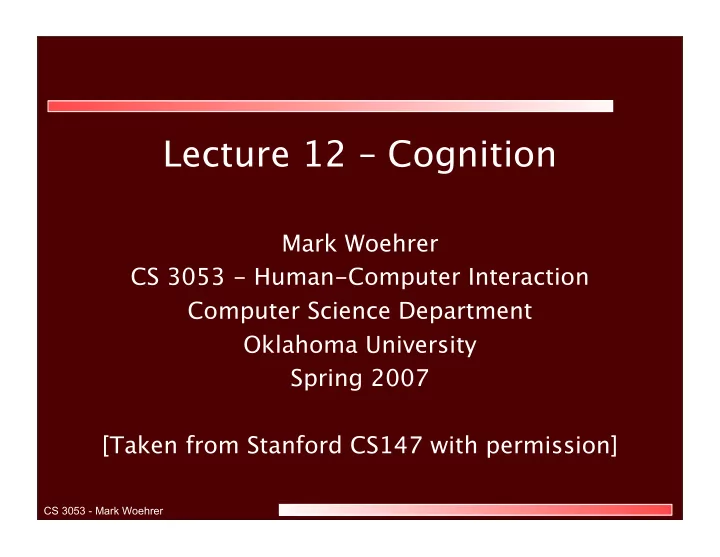

Lecture 12 – Cognition Mark Woehrer CS 3053 - Human-Computer Interaction Computer Science Department Oklahoma University Spring 2007 [Taken from Stanford CS147 with permission] CS 3053 - Mark Woehrer
Learning Goals •Be familiar with the di fg erent basic theories of cognition and their relevance to interaction design •Know specific aspects of memory, attention, and motor activity that have direct design implications CS 3053 - Mark Woehrer
Cognition is a Complex Interaction External environment Sensory organs Internal environment Sensory memory Long-term memory Working memory Cognitive Processing Emotion Skills Arousal Motor organs Adapted from Waern, pp. 11 and 14 CS 3053 - Mark Woehrer
Goals for a Theory of Cognition • Phenomena – What perceptual and mental phenomena are potentially relevant? • Measurements – How can those phenomena be quantified in a way that makes it possible to discover general patterns, principles, or laws? • Models – What formal and/or computational models can predict cognitive behavior based on those regularities? • Designs – How can designers make use of the models and principles to produce more e fg ective interactions? • Evaluation – How can principles and designs be systematically tested, controlling dimensions of unwanted variance and measuring the intended e fg ects? CS 3053 - Mark Woehrer
Approaches to Cognition • Human Information Processing – The mind as computer • Constructivism – Perception is shaped by prediction and action • Ecological Psychology – Interaction between system and environment • Phenomenology – Phenomena as experienced CS 3053 - Mark Woehrer
Human Information Processing CS 3053 - Mark Woehrer
Limited Processing Resources • Memory capacities • Processing capacities • Communication channels CS 3053 - Mark Woehrer
Memory components • Sensory Memory < 1 second • Short-term (Working Memory) 10-15 seconds • Long-term Memory Years • [demonstrations] CS 3053 - Mark Woehrer
Sensory memory CS 3053 - Mark Woehrer
Sensory memory D H F G V J S A L K O P CS 3053 - Mark Woehrer
Sensory memory CS 3053 - Mark Woehrer
Sensory memory M R T J A F K P Z D N O CS 3053 - Mark Woehrer
Sensory memory CS 3053 - Mark Woehrer
Short term (working) memory • Capacity – Miller’s Magic Number 7 ± 2 – Chunking • Salience - The serial position e fg ect – Primacy – Recency CS 3053 - Mark Woehrer
Long term memory • Semantic Memory - Concepts – Recognition vs. recall • Episodic Memory - Things that happened – Distortion and Meaning • Procedural Memory - Skilled behavior - Automaticity – Not just motor CS 3053 - Mark Woehrer
Perceptual - Vision • Foveal attention (4-8 degrees) – The fovea is less than 1% of the retina but takes up over 50% of the visual cortex in the brain. • Eye motion – saccades – Saccades last from about 20 to 200 milliseconds • Visual search – pop-out CS 3053 - Mark Woehrer
Eye Gaze – saccades Here is a picture and eye movements from subjects looking at it. 1. free viewing. 2. Estimate the economic status of the individuals. 3. Judge their ages.
Visual Search and Pre-attentive Processing CS 3053 - Mark Woehrer
Attention • Focused vs. divided attention – Conscious attention – The flashlight metaphor – Cocktail party e fg ect • Channels • Interference – Stroop e fg ect • Amount of attention / arousal CS 3053 - Mark Woehrer
Stroop Effect Green Red Blue CS 3053 - Mark Woehrer
Motor Performance (Fitt’s Law) D S T = a + b log 2 (2 D / S ) CS 3053 - Mark Woehrer
Constructivism CS 3053 - Mark Woehrer
Ambiguous Figures CS 3053 - Mark Woehrer
Motion Perception CS 3053 - Mark Woehrer
Motion Perception CS 3053 - Mark Woehrer
Motion Perception CS 3053 - Mark Woehrer
Motion Perception CS 3053 - Mark Woehrer
Ecological Psychology • Interaction between system and environment • A fg ordances (see Norman discussion) "It's not what is inside the head that is important, it's what the head is inside of" CS 3053 - Mark Woehrer
Phenomenology • Phenomena as experienced • Coupling to the environment – The blind person’s cane – The mouse and the cursor http://plato.stanford.edu/entries/phenomenology/ CS 3053 - Mark Woehrer
Flow - Csikszentmihalyi Stress Flow Difficulty Apathy Boredom Skill http://en.wikipedia.org/wiki/Mihaly_Csikszentmihalyi CS 3053 - Mark Woehrer
Recommend
More recommend